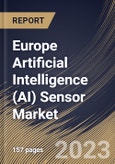Most developments have been recorded by AI-based sensors, notably in the human-machine interface. The need for AI-based sensors is rising due to the benefits of AI becoming more prevalent. The expansion of artificial intelligence applications also increases demand for AI sensors products. The automobile industry is predicted to have a significant demand for AI-based sensors.
The key drivers for the growth of the automotive artificial intelligence-based sensors are the rising demand for convenience features that improve the customer experience, the advancement of autonomous vehicle technology, growing privacy & security concerns, and the rising demand for enhanced vehicle segments.
Government initiatives, funding programs, and partnerships are critical in determining how AI sensors are used and adapted. For instance, the European Union has allotted a lot of money for AI-related projects like AI sensors. The EU's research and innovation financing program Horizon 2020, which lasted from 2014 to 2020, allocated almost €80 billion to initiatives, including AI technologies. The European Commission has also started the Digital Europe Program, which aims to invest in crucial digital technologies like cybersecurity, supercomputing, artificial intelligence, and advanced digital skills.
The development of smart cities will receive an additional EUR 500 million from Germany. Germany is spending a total of EUR 1,250 billion to promote creating and applying urban technologies. Over the course of centuries, urban areas in Germany and Europe have grown. The relevance of strategic urban development using digital technologies is widely acknowledged, given that 77 percent of Germans reside in cities and towns. Modern urban living is being disrupted by technology, which has the potential to raise living standards. With all this, the adoption of AI sensors would also surge in areas amid smart city concepts. As a result of the expansion of smart city projects and the urbanization in this region, the market will expand in the upcoming years.
The Germany market dominated the Europe Artificial Intelligence (AI) Sensor Market by Country in 2022 and would continue to be a dominant market till 2030; thereby, achieving a market value of $2,525.5 million by 2030. The UK market is exhibiting a CAGR of 37.3% during (2023-2030). Additionally, The France market would experience a CAGR of 39.5% during (2023-2030).
Based on Type, the market is segmented into Optical, Motion, Position, Pressure, Navigation, Temperature, Ultrasonic, and Others. Based on Technology, the market is segmented into Machine Learning, Natural Language Processing, Computer Vision, and Context-aware Computing. Based on Application, the market is segmented into Smart Home Automation, Healthcare, Automotive, Manufacturing, Robotics, Aerospace & Defense, Consumer Electronic, and Others. Based on countries, the market is segmented into Germany, UK, France, Russia, Spain, Italy, and Rest of Europe.
The market research report covers the analysis of key stake holders of the market. Key companies profiled in the report include Robert Bosch GmbH, Sensata Technologies Holdings PLC, Sony Corporation, Baidu, Inc., BAE Systems PLC, Oracle Corporation, RELX PLC (LexisNexis Risk Solutions, Inc.), Sensirion AG, ACI Worldwide, Inc. and SAS Institute, Inc.
Scope of the Study
By Type
- Optical
- Motion
- Position
- Pressure
- Navigation
- Temperature
- Ultrasonic
- Others
By Technology
- Machine Learning
- Natural Language Processing
- Computer Vision
- Context-aware Computing
By Application
- Smart Home Automation
- Healthcare
- Automotive
- Manufacturing
- Robotics, Aerospace & Defense
- Consumer Electronic
- Others
By Country
- Germany
- UK
- France
- Russia
- Spain
- Italy
- Rest of Europe
Key Market Players
List of Companies Profiled in the Report:
- Robert Bosch GmbH
- Sensata Technologies Holdings PLC
- Sony Corporation
- Baidu, Inc.
- BAE Systems PLC
- Oracle Corporation
- RELX PLC (LexisNexis Risk Solutions, Inc.)
- Sensirion AG
- ACI Worldwide, Inc.
- SAS Institute, Inc.
Unique Offerings
- Exhaustive coverage
- The highest number of Market tables and figures
- Subscription-based model available
- Guaranteed best price
- Assured post sales research support with 10% customization free
Table of Contents
Companies Mentioned
- Robert Bosch GmbH
- Sensata Technologies Holdings PLC
- Sony Corporation
- Baidu, Inc.
- BAE Systems PLC
- Oracle Corporation
- RELX PLC (LexisNexis Risk Solutions, Inc.)
- Sensirion AG
- ACI Worldwide, Inc.
- SAS Institute, Inc.








